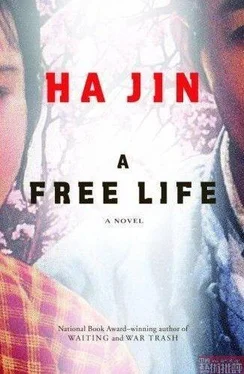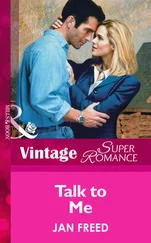Slowly Nan followed the traffic on Beaver Run Road, still puzzled by Danning's claim to be cleaner than before. On the other hand, he was convinced that if his friend had often gone to a church or temple or mosque, Danning might indeed have become a better man.
Nan was broody after seeing Danning off on a quarter-filled Greyhound bound for Oxford, Mississippi. He felt he might not see his friend again. Danning seemed tormented by a kind of desperation, which might not subside as long as he lived in Beijing and held his official position. Nan had never thought that his friend would go downhill as a result of his fame, which seemed to have let loose the demon in him.
Danning's visit had upset Nan. For the following week he went on telling his wife that success was the mother of failure, transposing Chairman Mao's famous quotation "Failure is the mother of success."
EVER SINCE his return from China, Nan had been restless for another reason as well. He couldn't make any progress in his writing. As he had failed in his search for an ideal woman, his project on a bunch of love poems had come to a halt. He wondered if he was suffering a writer's block. One afternoon, when the busy lunchtime was over, he was sitting at the counter and had his nose in a book entitled Good Advice on Writing. Both Pingping and Niyan were taking a break, seated at a booth, drinking tea and cracking spiced sunflower seeds. Janet was with them and from time to time lifted her cup and blew away the tea leaves. She was talking excitedly about how happy she and her daughter were in the weekend school at Emory, which, managed by a Chinese graduate student, had more than 160 pupils now. Time and again she uttered a word or phrase in Mandarin.
Nan stopped at a quotation from Faulkner. It stated: "The writer must teach himself that the basest of all things is to be afraid; and, teaching himself that, forget it forever, leaving no room in his workshop for anything but the old verities and truths of the heart, the old universal truths lacking which any story is ephemeral and doomed- love and honor and pity and pride and compassion and sacrifice."
The first part of the sentence jolted Nan, who suddenly understood the real cause of his predicament. For all these years he had bumbled around and shilly-shallied about writing because of fear: the fear of becoming a joke in others' eyes, of messing up his life without getting anywhere, of abandoning the useless, burdensome part of his past in order to create a new frame of reference for himself, of moving toward the future without looking back. It was this fear that had driven him to look for inspiration elsewhere other than in his own heart. It was this fear that had misled him into the belief that the difficulties in writing poetry in English were insurmountable and that he couldn't possibly write lines that were natural and energetic. Now this realization overcame and disgusted him. He read Faulkner's words once more. His mind hardly registered the meaning of the second part, but the first half again astounded him. Tears were rolling down his cheeks. How he hated himself! He had wasted so many years and avoided what he really desired to do, inventing all kinds of excuses-his sacrifice for his son, his effort to pay off the mortgage, his pursuit of the American dream, his insufficient command of English, his family's need for financial security, the expected arrival of a daughter, and the absence of an ideal woman in his life. The more he thought about his true situation, the more he loathed himself, especially for his devotion to making money, which had consumed so many of his prime years and dissolved his will to follow his own heart. A paroxysm of aversion seized him, and he turned to the cash register, took all the banknotes out of the tray, and went to the alcove occupied by the God of Wealth, for whom they had always made weekly offerings. With a swipe he sent flying the wine cups, the joss sticks, and the bowls of fruit and almond cookies. Around him were scattered pistachios and salted cashews. The three women in the booth stopped chatting to watch him. He thrust a five-dollar bill on the flame of a candle and instantly the cash curled, ablaze.
"My God, he's burning money!" gasped Janet.
They all got up and rushed over. Niyan clapped her palm over her mouth as Nan was setting aflame a whole sheaf of banknotes. "What are you doing?" his wife cried, and yanked his shoulder from behind.
His fell on his bottom, the cash still blazing in his hand. He looked entranced and dewy-eyed. Pingping yelled again, "Don't burn our sweat money!"
Niyan wrenched a few unburned banknotes out of his other hand, and he tossed the rest at the smiling God of Wealth. Pingping shoved him aside and tried to save the flaming bills while Nan flung up his hands and cried, "I want to burn it all, all zis 'dirty acre.' "
"He must be having a breakdown," Janet said.
"I hate this mahney, this 'dirty acre'!" he yelled in a voice verging on a sob. His eyes gave a flare.
"What he talking about?" Pingping asked Janet, who shook her head, having no clue either.
Nan had meant to say "filthy lucre," but in the throes of frenzy he got the idiom wrong. He picked himself up from the floor and stamped on the half-burned cash, saying through his teeth, "Dirty acre! Dirty acre!" His face was misshapen, his eyes smoldering with pain.
The women were too confused to respond. He turned and stormed away to the kitchen. Pingping was wiping her eyes while Niyan clucked her tongue and said as if to herself, "Why he hate money so much?"
Janet wagged her chin. "Maybe his mind just snapped. It often happens to people who have too much stress."
"He's really crazy," Niyan said, as if out of schadenfreude.
"He's just sick man," Pingping wailed, and doubled over, her face twisted. "Now you see this is real Nan. He always want to torture me."
Nan thundered from the kitchen, "Yeah, I'm sick, sick of every-sing here, sick of myself, sick of every one of you, sick of zis goddamned restaurant!"
They were stunned. None had expected he had such a harsh, menacing voice. "Maybe he should go see a shrink," suggested Janet, patting Pingping on the back as she continued to convulse with sobs.
Nan went out the back door to traipse around the shopping center awhile, his mind still whirling. The sun was scorching overhead, and in no time perspiration soaked the back of his T-shirt. The walk calmed him down some, though he still couldn't focus on any thought. Near the entrance to the photo studio toward the east end of the plaza, a mottled gray pigeon that had to be a crossbreed of a pigeon and a dove limped over, walking on the back of its crippled left foot. Its head kept bobbing at a cockeyed angle as it tottered toward Nan, who had often fed it. Nan fished in his pockets but found only a handful of coins, so he stepped aside to avoid obstructing its path. Before the pigeon passed by, it paused to flutter its wings, which suddenly gleamed in the sunlight. If only Nan had had some crumbs or leftovers on him. He liked this lone bird, which was tough, unafraid of people.
When Nan went back to the Gold Wok twenty minutes later, he became himself again, and without a word set about cutting a basket of eggplants, which were all tender and seedless, handpicked by Pingping at the Cherokee farmers' market. For the rest of the day he was very quiet and did everything he was supposed to do.
PINGPING was still angry with Nan for burning the money. For three days she'd avoid rubbing elbows with him at work, and neither would she speak to him. However hard he tried to induce her to talk, she'd compress her lips. At most, she'd give a faint smile if he said something funny or silly.
On Monday morning the truck that delivered groceries came as usual and left two crates of celeries and napa cabbages and a bucket of tofu at the back door to the restaurant. Without telling Nan, who was supposed to move them, Pingping began carrying them in by herself. As she was lifting a crate, suddenly a tearing pain shot through her back and her knees buckled. She fell on the cement doorstep, unable to pick herself up. " Nan, come and help me!" she called out. Two flies, startled, took off from the tofu, whirling around at a high pitch.
Читать дальше












